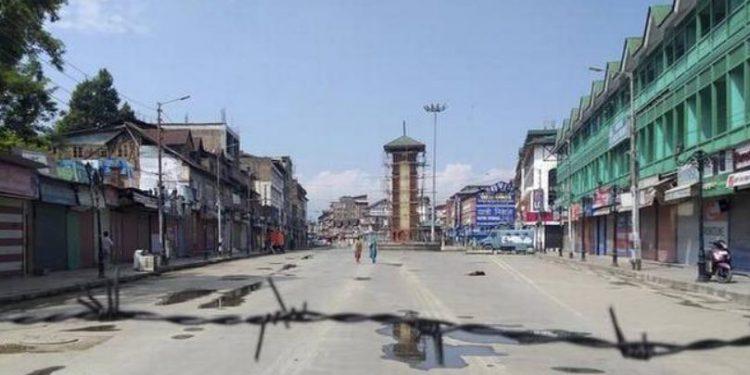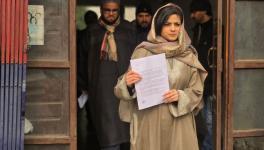Is Blanket Ban on Internet an Inessential Order in J&K?

The Internet is not more merely a means of communication but a crucial aspect of daily life, without which life effectively comes to a standstill. ANUSHREE RAI and PRAVAH RANKA on the constitutionality of internet restrictions in Kashmir.
In August 2019, the Government of India abrogated Article 35 (A) and Article 370 of the Constitution of India, revoking the special status enjoyed by the state of Jammu and Kashmir. As a consequence of the abrogation, the government forbade all broadband and mobile internet services in the area, citing reasons such as misinformation on social media.
In January 2020, 2G Internet services were restored with no access to social media platforms.
Responding to a petition brought by the Foundation of Media Professionals, the Apex Court ordered the constitution of a special committee that would assess internet restrictions in the territory of Jammu and Kashmir.
The Supreme Court held that the “blanket order” didn’t “provide any reasons to reflect that all the districts of the Union Territory of Jammu and Kashmir require the imposition of such restrictions.”
However, the court after considering the “compelling circumstances of cross-border terrorism” refrained from calling it a constitutional violation. Instead, it directed for a special committee to periodically review these restrictions.
Right to Internet Access is a Fundamental Right
In Faheema Shirin R.K. v. State of Kerala, the Kerala High Court upheld the Right to Internet access as a fundamental right under Article 21 of the Indian Constitution. Article 21 states that “No person shall be deprived of his life or personal liberty except according to the procedure established by law.”
The Internet is considered as a means of speech and expression and Article 19 provides all citizens with ‘the right to freedom of speech and expression’. Thus, restrictions on Internet access also violate Article 19 of the Indian Constitution.
Therefore, the Kerala High Court judgment alone makes it apparent that the internet ban has threatened human rights and violated the fundamental rights of people across Jammu and Kashmir.
The Supreme Court in Minerva Mills v. Union of India held that fundamental rights may only be suspended in uncommon circumstances and such suspension should not come at the cost of human freedoms. The right to Internet access was declared as a fundamental right under Article 19 and Article 21 of the Indian Constitution. The judgment pronounced:
“If by a constitutional amendment, the application of Articles 14 and 19 is withdrawn from a defined field of legislative activity, which is reasonable in public interest, the basic framework of the constitution may remain unimpaired. If the protection of those articles is withdrawn in respect of an uncatalogued variety of laws, fundamental freedoms will become a ‘parchment in a glass case’ to be viewed as a matter of historical curiosity”
The apex court reiterated this in another landmark judgment of the Internet and Mobile Association of India v. Reserve Bank of India. It held that the imposition of restrictions on Fundamental Rights ought to be the ‘least onerous’ in nature. The judgment further asserted that the disadvantages ensued due to such restrictions are not disproportionate to the intended aims.
The Supreme Court held that exercising other fundamental rights through the internet is a fundamental right itself.
Therefore, preventing the right to internet access doesn’t allow for the enforcement of the other fundamental rights. The Court further held:
“We declare that the freedom of speech and expression and the freedom to practice any profession or carry on any trade, business or occupation over the medium of the Internet enjoys constitutional protection under Article 19(1)(a) and Article 19(1)(g). The restriction upon such fundamental rights should be in consonance with the mandate under Article 19 (2) and (6) of the Constitution, inclusive of the test of proportionality.”
The apex court stated that internet services can only be restricted by citing legitimate reasons, hence the restrictions imposed must follow the principle of ‘necessity’ and the ‘test of proportionality’.
‘Test of Proportionality’ Vis-à-vis Internet Ban
In Anuradha Bhasin v. Union of India the honorable Supreme Court held:
“While imposing restrictions, the rights of individuals need to be balanced against the duty of the State to ensure security. The State must ensure that measures are in place that allows people to continue with their life, such as public transportation for work and schools, to facilitate business, etc. These restrictions need to be tested on the anvil of the test of proportionality.”
The court has laid down a structured four-step proportionality test to determine whether a restriction on fundamental rights is legitimate or not.
In Modern Dental College and Research Centre v State of Madhya Pradesh, the Supreme Court defined ‘proportionality’. It stated, “Jurisprudentially, ‘proportionality’ can be defined as the set of rules determining the necessary and sufficient conditions for limitation of a constitutionally protected right by a law to be constitutionally permissible.”
The court further laid down four components of proportionality that had to be satisfied to exercise this doctrine. The court relied on the components established by Aharon Barak who was the former Chief Justice of the Supreme Court of Israel.
The components established were as following:
1. It is designated for a proper purpose;
2. The measures undertaken to effectuate such a limitation are rationally connected to the fulfillment of that purpose
3. The measures undertaken are necessary for that there are no alternative measures that may similarly achieve that same purpose with a lesser degree of limitation; and finally.
4. There needs to be a proper relation between the importance of achieving the proper purpose and the social importance of preventing the limitation on the constitutional right.
The Jammu and Kashmir (J&K) Government ordered against the restoration of normal internet services upon the apprehension that several cross border terrorists were using the internet to promote their propaganda, causing large-scale violence and disturbing the public order.
Although the government did offer limited relaxation, it held back for the most part. The J&K government allowed broadband services to institutes that offer essential services. It provided internet connectivity on 2G speed and granted access to a set of “white-listed websites” for internet users.
Despite the petty relief, it didn’t dispense access to social media platforms. Moreover, when the second-order passed in exercising the Telecom Suspension Rules, the government stated that there hadn’t been any adverse impact after it restored limited Internet services.
Meanwhile, the J&K government repeated their apprehensions over the restoration of the internet, that it could be used for ‘incitement and rumor-mongering, and by anti-national elements’.
Contrary to the state’s arguments in the Foundation for Media Professionals Case, these orders lay bare that the government always had less-restrictive measures that could have been used to protect the fundamental rights of individuals.
When a less-restrictive alternative already existed, the state didn’t need to go all out in banning Internet services in the area.
The government justified the Internet ban for public order concerns but there was always a less-restrictive measure present to avoid a blanket ban.
The test of proportionality, if propounded with good intentions can be a boon for the masses. If not, it can become a tool for wide-ranging abuse of power and disproportionate curbs to freedom.
It is evident how the internet restrictions imposed in Kashmir fail to pass the test of proportionality and can be termed arbitrary.
It must be ensured that whatever restrictions are imposed on the exercise of fundamental rights, must not be imposed at the cost of civil liberties, and the effect of the restriction is not disproportionate to the intended end. In other words, the abridgment must be ‘least onerous’.
Though there has been a sliver of relief, we still have a long way to go.
The right to freedom of the internet represents our ideals and should be treated as an extension of oneself, and therefore must be secured at the highest degree of protection.
Jammu and Kashmir should be viewed as an intrinsic part of the nation and the citizens that reside there should not be arbitrarily denied their right to internet access.
(Anushree Rai and Pravah Ranka are law students at the Gujarat National Law University. Views are personal.)
The article was originally published in The Leaflet.
Get the latest reports & analysis with people's perspective on Protests, movements & deep analytical videos, discussions of the current affairs in your Telegram app. Subscribe to NewsClick's Telegram channel & get Real-Time updates on stories, as they get published on our website.
























